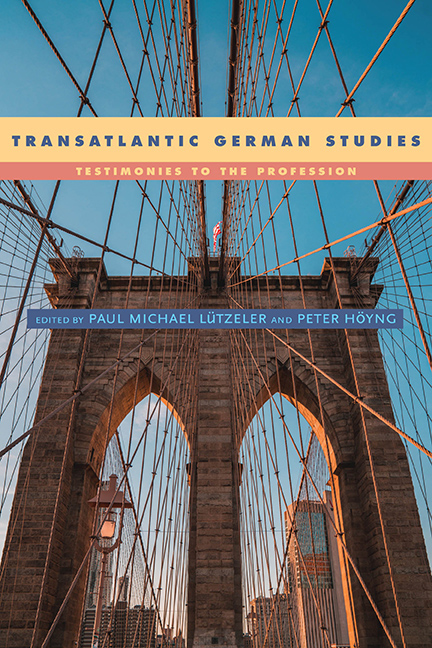Book contents
- Frontmatter
- Dedication
- Contents
- Acknowledgments
- Introduction
- From Erfahrungshunger to Realitätshunger: Futurity, Migration, and Difference
- In-between: The Participant as Observer—The Observer as Participant
- Transatlantic Space and My Own History of Globalization
- Deplazierte Personen: Why Would an American Become a Germanist?
- Metamorphoses and Meanderings of a Wanderer between Worlds
- German Studies as Vocation: My Path into It, Out of It, and Back into It
- My Long Way from Germanistik to Afro German Studies
- Mustang Red: My American Road to Critical Theory
- Third Place: How a French Germanist Became an Applied Linguist in America
- Transatlantic Exchanges: German Studies—European and American Style
- Being at Home in the Other: Thoughts and Tales from a Typically Atypical Germanist
- After Australia: Triangulating an Intellectual Journey
- A Tale in Translation: An Academic Itinerary from Istanbul to Bryn Mawr
- Beyond Passing: Transculturation in “Contact Zones”
- Far from Where? Germanistik between the Continents
- Epilogue: The Usefulness of Useless Studies
- Index
My Long Way from Germanistik to Afro German Studies
Published online by Cambridge University Press: 14 February 2019
- Frontmatter
- Dedication
- Contents
- Acknowledgments
- Introduction
- From Erfahrungshunger to Realitätshunger: Futurity, Migration, and Difference
- In-between: The Participant as Observer—The Observer as Participant
- Transatlantic Space and My Own History of Globalization
- Deplazierte Personen: Why Would an American Become a Germanist?
- Metamorphoses and Meanderings of a Wanderer between Worlds
- German Studies as Vocation: My Path into It, Out of It, and Back into It
- My Long Way from Germanistik to Afro German Studies
- Mustang Red: My American Road to Critical Theory
- Third Place: How a French Germanist Became an Applied Linguist in America
- Transatlantic Exchanges: German Studies—European and American Style
- Being at Home in the Other: Thoughts and Tales from a Typically Atypical Germanist
- After Australia: Triangulating an Intellectual Journey
- A Tale in Translation: An Academic Itinerary from Istanbul to Bryn Mawr
- Beyond Passing: Transculturation in “Contact Zones”
- Far from Where? Germanistik between the Continents
- Epilogue: The Usefulness of Useless Studies
- Index
Summary
I HAVE BEEN ASKED “Why did you choose German?” On one level the question implies “Why did you take a language spoken by people involved in two world wars and countless atrocities?” Also implied is “Why would an African American want to study German?” Both questions explicitly associate German language and culture with an Aryan, xenophobic world view in which people of color were unthinkable and undesirable. Having grown up in Lancaster, Pennsylvania, a predominantly German heritage area, my initial response to the question was a simple “I like the language.”
Nothing in my first years of learning German gave me a reason to delve deeper into my visceral affinity for the language. From my sophomore until my senior year in high-school, German class was an exercise in linguistic archeology and mental discipline. We were taught using the traditional grammar-based approach. Literature was the key to correct language learning and our first model text was Theodor Storm's novella Immensee and our grammar guidebook a D.C. Heath grammar from before World War I by E. S. Sheldon. Each year our class consisted of about thirty American pupils and a displaced person whose native language was German. That pupil, usually a young woman, would read the sentence aloud, we would repeat it chorally, and then one student was asked to translate and another to explain grammatical structures in the sentence.
That was our class routine five hours a week throughout the school year. Tests consisted of vocabulary quizzes for which we were required to identify equivalents, either in German or English, of vocabulary items. One example: for “the book” we were to write “das Buch, des Buches, and die Bücher.” Verbs were to be conjugated in all forms of the indicative, subjunctive, and passive. Future and the future perfect were to be retained along with direct and indirect discourse. One linguistic artifact that remains with me today is the “Absolute Genitive,” for example, “Festen Schrittes ging er durch die Tür.” And so it went for two and one half years until our teacher became terminally ill in my senior year.
- Type
- Chapter
- Information
- Transatlantic German StudiesTestimonies to the Profession, pp. 106 - 123Publisher: Boydell & BrewerPrint publication year: 2018
- 1
- Cited by

